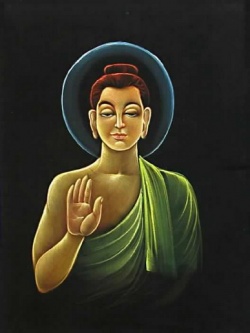Cittagahapati
Citta (called Cittagahapati).-A householder of Macchikāsanda, where he was Treasurer.
He was later declared by the Buddha to be pre-eminent among laymen who preached the Doctrine (A.i.26).
On the day of his birth the whole city was covered knee-deep with flowers of various hues, hence his name.
When Mahānāma visited Macchikāsanda, Citta, pleased with his demeanour, invited him to his park, the Ambātakārāma, and built for him a monastery there.
And there the Elder preached to Citta the Salā-yatana-vibhatti and Citta became an Anāgāmī.
Thereafter many monks visited the Ambātakārāma and accepted Citta's hospitality.
Among them was Isidatta, a former acquaintance of Citta, but Isidatta left when he found that his identity had been discovered. Mahānāma and Mahaka did likewise, after having performed miracles at the request of Citta.
The Citta Samyutta (S.iv.282ff) contains a record of conversations between Citta and members of the Order, among whom, besides those already mentioned, were Kāmabhū and Godatta Thera. Citta is also said to have had discussions with Nigantha Nātaputta and Acela Kassapa and to have refuted their views.
A Thera named Sudhamma was a permanent resident in the Ambātakārāma and was looked after by Citta.
Once, when the two Chief Disciples and several other eminent Elders came to the Ambātakārāma, Citta invited first these and then Sudhamma;
the latter, feeling slighted, blamed Citta beyond measure, but the Buddha, hearing of this, sent Sudhamma to ask for Citta's pardon (Vin.ii.15ff; DhA.ii.74f; for details see Sudhamma).
Some time later, Citta visited the Buddha.
He was accompanied by two thousand others and took with him five hundred cartloads of offerings to the Buddha and the Order.
As he fell at the feet of the Buddha, flowers of five hues showered from the sky and the Buddha preached to him the Salāyatana-vibhatti.
For a fortnight he continued distributing his gifts to the Order and the devas filled his carts with all kinds of valuables (AA.i.210).
When Citta lay ill just before his death, devas visited him and advised him to wish for kingship among them, but he refused to aspire to anything so impermanent, and instructed the devas and his kinsfolk gathered round him, telling them of the Buddha and his teachings (S.iv.302f).
He is regarded as the ideal layman (E.g., at A.i.88; ii.164; iii.451).
He owned a tributary village called Migapattaka (SA.iii.93).
In the time of Padumuttara Buddha, Citta conceived his desire to be placed first among laymen in the teaching of the Dhamma. In the time of Kassapa Buddha he was a huntsman.
One day, seeing a monk in a glen, and being pleased thereat, he hurried home, prepared a meal and brought it to the monk, together with flowers he had gathered on the way.
After the offering, he made a wish that he should never lack for tribute and that showers of flowers should fall on him.
In the deva-world he surpassed all others in his great beauty (AA.i.209). In the Bhisa Jātaka (J.iii.314), he is identified with the slave.
Though Citta was not an arahant, he possessed the patisambhidā of a probationer (sekha). Vsm.442.
